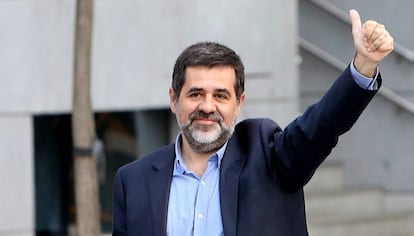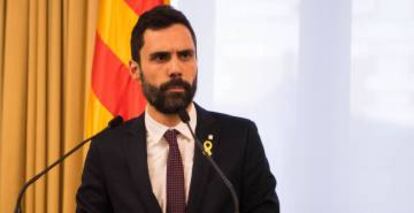Catalonia awaits its third nominee to the premiership in three months
After Jordi Sànchez drops his bid, parliament speaker announces new round of talks with parties

The speaker of the Catalan parliament, Roger Torrent, said that he will open up a new round of talks with party leaders on Thursday in a fresh bid to find a candidate to lead the region following the snap election of December 21.
Torrent noted in a public address that it has been exactly three months since Catalans went to the polls following a unilateral declaration of independence that led Madrid to temporarily revoke the region’s powers of self-rule and call new elections.
Any name will be bad if it means presiding a regional government, and good if it means presiding a republican one
Carles Riera, CUP
Torrent, of the separatist Catalan Republican Left (ERC), described the situation as one of “exceptionality and exile,” a reference to Carles Puigdemont, the ousted premier who opted to flee to Belgium to avoid arrest over rebellion charges in connection with the unilateral independence bid.
The slim separatist majority that emerged from the ballots has so far failed to produce a nominee who is not hindered by legal troubles. The first suggested candidate was Puigdemont, who cannot be remotely appointed; then it was Jordi Sànchez, a pro-independence activist who is in pre-trial custody over a street protest that is alleged to have hindered a police raid against organizers of the illegal October 1 referendum.
Third try
This will be the third attempt at holding an investiture debate in Catalonia, after the January 30 session was canceled, and a new one set for March 12 also placed on hold because neither Puigdemont nor Sànchez were in a situation to personally attend, a requirement for any nominee to the premiership.
Torrent talked about the Spanish state’s “incompetence” in dealing with the situation, and about a “democratic involution” in Catalonia. He also admonished the Supreme Court for failing to release Jordi Sànchez to let him attend the investiture debate in the Catalan assembly.

On Wednesday, Sànchez said in a letter to Torrent that he will not be running for the post. The decision by Sànchez, former head of the pro-independence association Catalan National Assembly (ANC), to drop his bid and give up his seat in parliament paves the way for a new candidate to step up.
The most likely candidate so far appears to be Jordi Turull, a former member of the Puigdemont administration, who is also under court investigation but who was released on bail after being briefly detained.
The central government in Madrid considers that Turull comes closer to being “a normal candidate,” in the words of Prime Minister Mariano Rajoy, who wishes to see Catalan parties propose a nominee who is not in trouble with the law. Even though he would be free to attend the investiture session, Turull is still caught up in a probe into the illegal independence declaration of October 27, and if found guilty at trial he could be barred from holding public office.
Difficult math
Speaker Torrent has not specified a date for the session to vote in a new Catalan leader, but everything seems to indicate that it will be next week. The vote will in fact take up two sessions, because nobody expects the candidate to attract enough votes for an absolutely majority in the first round. A run-off must be held 48 hours later and produce a simple majority (more yes than no votes).
But even that second scenario is no longer assured, since the radical CUP party, a small but necessary partner in the separatist coalition, says it will not support Jordi Turull or any other candidate who does not openly support disobedience and the creation of an independent republic – rather than merely seeking greater powers of self-rule within the Spanish state, as the CUP believes that Puigdemont’s Junts per Catalunya (Together for Catalonia) and ERC now wish to do.
Turull and Convergència
Turull was a historical leader of the now-defunct Convergència party, which morphed into the European Democratic Party of Catalonia (PDeCAT). The opposition has noted that Turull once publicly supported fellow party members ensnared in a far-reaching bribes-for-contracts investigation known popularly as “the 3% case.” The court that oversaw the Palau case found Convergència guilty of charging €6.6 million in illegal commissions for public works contracts.
The CUP gained prominence during the economic crisis by campaigning not just for independence but also against political corruption and the economic policies of the Catalan government, then run by a coalition made up of Convergència and another party, Unió Democràtica de Catalunya.
The anti-establishment CUP has said that its four deputies will abstain at any vote to appoint Turull. Secessionists secured 70 out of the 135 seats at the December election, but two are held by Carles Puigdemont and former Cabinet member Toni Comín, who also fled to Belgium and cannot cast a ballot or delegate their votes. So far, both have refused to give up their seats to another party member.
This leaves separatists with 64 seats, one less than the 65 held by other parties in the Catalan parliament, who have already announced that they will not support a candidate presented jointly by Puigdemont’s Junts per Catalunya (Together for Catalonia) and ERC.
“Either the people rule or the Constitutional [Court of Spain] rules,” said CUP representative Carles Riera, adding that his party’s priority is disobedience, and that the candidate’s identity is secondary. “Any name will be bad if it means presiding a regional government, and good if it means presiding a republican one.”
Formal charges
Supreme Court Justice Pablo Llarena, who is investigating the leaders of the unilateral independence bid, has summoned all parties to an arraignment hearing at 10.30am on Friday. Not all 28 targets of the probe will necessarily be formally charged, but this is very likely for the four former government officials currently in pre-trial detention (Oriol Junqueras, Joaquim Forn, Jordi Sànchez and Jordi Cuixart). Six more face precautionary measures, while the officials who fled to Belgium will likely be arraigned as well. Anna Gabriel, a former CUP deputy who fled to Switzerland in February, could be included.
English version by Susana Urra.
Tu suscripción se está usando en otro dispositivo
¿Quieres añadir otro usuario a tu suscripción?
Si continúas leyendo en este dispositivo, no se podrá leer en el otro.
FlechaTu suscripción se está usando en otro dispositivo y solo puedes acceder a EL PAÍS desde un dispositivo a la vez.
Si quieres compartir tu cuenta, cambia tu suscripción a la modalidad Premium, así podrás añadir otro usuario. Cada uno accederá con su propia cuenta de email, lo que os permitirá personalizar vuestra experiencia en EL PAÍS.
¿Tienes una suscripción de empresa? Accede aquí para contratar más cuentas.
En el caso de no saber quién está usando tu cuenta, te recomendamos cambiar tu contraseña aquí.
Si decides continuar compartiendo tu cuenta, este mensaje se mostrará en tu dispositivo y en el de la otra persona que está usando tu cuenta de forma indefinida, afectando a tu experiencia de lectura. Puedes consultar aquí los términos y condiciones de la suscripción digital.








































